Cholera is a severe diarrhoeal disease that can be fatal within hours if not treated. Quick access to treatment is therefore crucial. Researchers estimate that there are 1.3 to 4 million cases and 21 000 to 143 000 deaths from cholera worldwide each year, with cases surging since 2021. Over 40 countries reported cases last year, and WHO estimates that 1 billion people are directly at risk.
Cholera remains a global public health threat closely linked to inequality and inadequate social and economic development. Access to safe water, basic sanitation and hygiene are essential to prevent cholera and other waterborne diseases.
WHO works to improve prevention and control of cholera globally, as well as increase awareness. WHO and partners also support research for the development of innovative strategies to prevent and control cholera.
Below are some examples of how WHO is collaborating with governments and partners across the world, with critical financial support from donors, to prevent and control cholera.
WHO and the French Development Agency strengthen emergency community responses to cholera in Democratic Republic of Congo
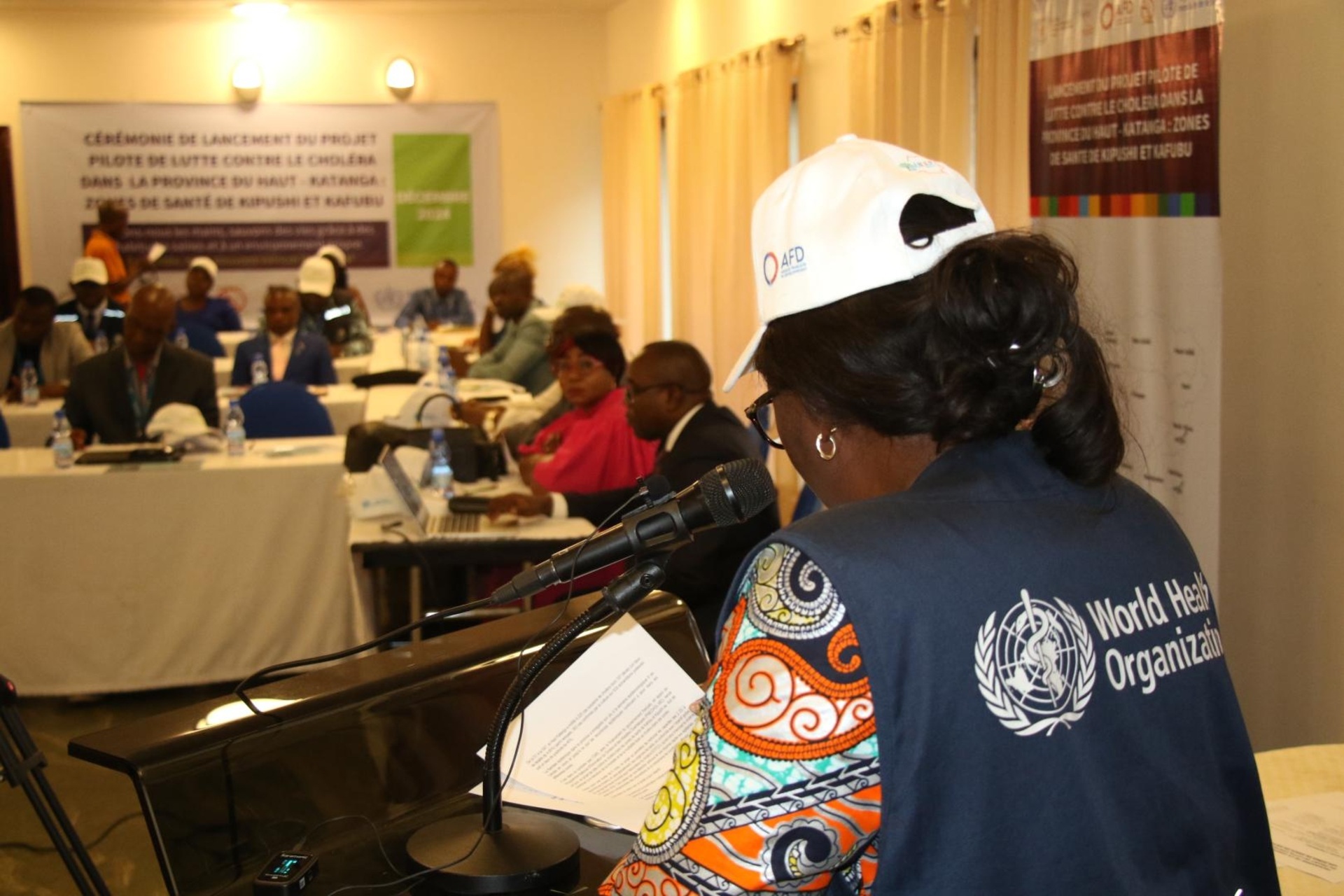 WHO and the French Development Agency launch a cholera response project in Haut-Katanga to strengthen emergency community responses.
WHO and the French Development Agency launch a cholera response project in Haut-Katanga to strengthen emergency community responses.
Photo by: WHO/Joel Lumbala
WHO, in partnership with the French Development Agency, has launched a catalytic US$ 392 000 project, working closely with the health authorities of Haut-Katanga and the National Program for the elimination of cholera and the fight against other diarrheal diseases.
This project aims to drastically reduce the risk of cholera epidemics in this southeastern province of the Democratic Republic of Congo. The project will provide medical supplies, improve infection prevention and control, install 40 oral rehydration points and build two semi-durable isolation treatment centres in the Kafubu and Kipushi health zones.
Over six months, the project will train 50 registered nurses and 140 community health workers in integrated disease surveillance and response, while raising awareness amongst the population on good hygiene practices. The health zones will also be empowered to locally produce liquid chlorine (bleach) to facilitate the decontamination of households affected by suspected cases of cholera, the treatment of drinking water and medical needs in health facilities. Solar kits and reagents will be available for 6 months.
Read the full story (in French)
Angola reinforces actions to end cholera with WHO support
 Deploying rapid response teams, training health personnel, establishing cholera treatment centres and units, providing safe drinking water, intensive community engagement, and the rollout of targeted vaccination campaigns is part of the urgent response measures against cholera. Photo by: WHO/Angola
Deploying rapid response teams, training health personnel, establishing cholera treatment centres and units, providing safe drinking water, intensive community engagement, and the rollout of targeted vaccination campaigns is part of the urgent response measures against cholera. Photo by: WHO/Angola
Since the onset of a cholera outbreak in Angola in January 2025, more than 14 000 cases and 505 associated deaths have been reported. Around 50% of the cases affected people under 20 years.
The Ministry of Health, in close coordination with WHO and other development partners, carried out a series of urgent response measures. These included deploying rapid response teams, training health personnel, establishing cholera treatment centres and units, providing safe drinking water, intensive community engagement, and the rollout of targeted vaccination campaigns.
In addition, health authorities, with support from WHO and United Nations Children's Fund (UNICEF), mapped and treated the country's main water access points. In early 2025, 28 public health officials from 15 municipalities in five of the most affected provinces were trained in mapping water sources. Nearly 320 water sources were mapped, improving access to treated water for people, particularly in Luanda and Icolo e Bengo provinces, which account for around 94% of cholera cases and 15% of related deaths in the country.
Read the full stories here and here
How WHO is supporting cholera outbreak response in Sudan
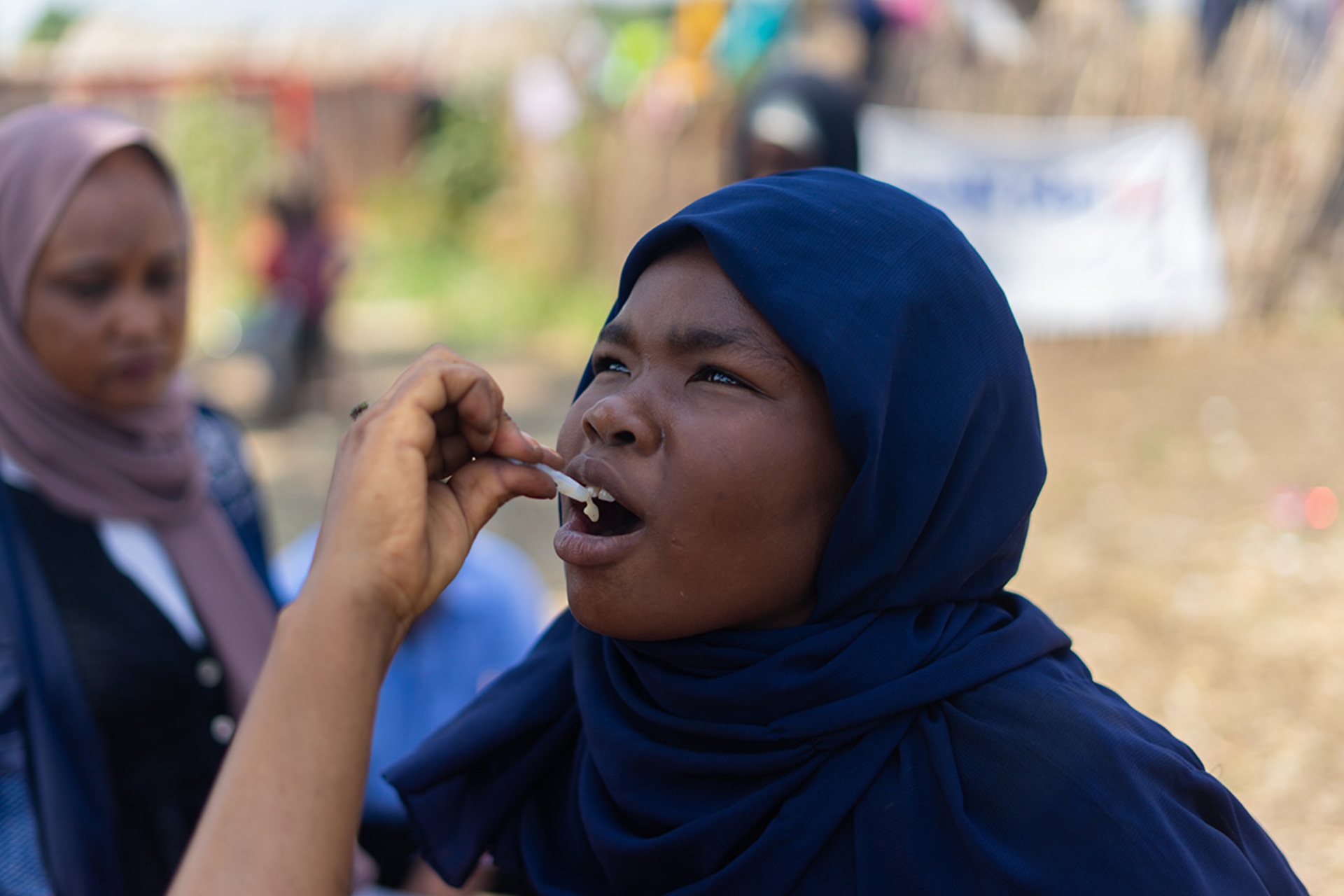 A child receives oral cholera vaccine in Baqa’a shelter for internally displaced people in Gedaref, October 2024. Photo by: WHO/Omer Tarig
A child receives oral cholera vaccine in Baqa’a shelter for internally displaced people in Gedaref, October 2024. Photo by: WHO/Omer Tarig
The Federal Ministry of Health of Sudan declared a cholera outbreak on 12 August 2024, following the confirmation of cases in Kassala State. Heavy rains, flooding, overcrowding, and limited access to clean water in displacement sites and within communities contributed to the rapid spread of the disease. As of 18 January 2025, the outbreak had affected 84 localities across 11 states, with more than 51 300 cases and 1 359 deaths reported.
As part of the response, the Federal Ministry of Health, with support from WHO and UNICEF, has conducted oral cholera vaccination campaigns in 8 states, reaching 7.4 million people.
WHO is supporting the outbreak response through comprehensive health interventions that include strengthening surveillance, deployment of rapid response teams for swift investigation of alerts, case management and improving water quality, sanitation and hygiene services in displacement sites and other at-risk communities.
WHO is able to deliver on its cholera commitment through the financial contribution of donors: Gavi, the Vaccine Alliance, the European Union Commission, United Nations Central Emergency Response Fund (CERF), United States Agency for International Development (USAID), UN Multi-Partner Trust Fund Office (MPTF), and the Governments of France and Germany.
WHO and partners launch second cholera vaccine dose to protect young refugees in Cox's Bazar
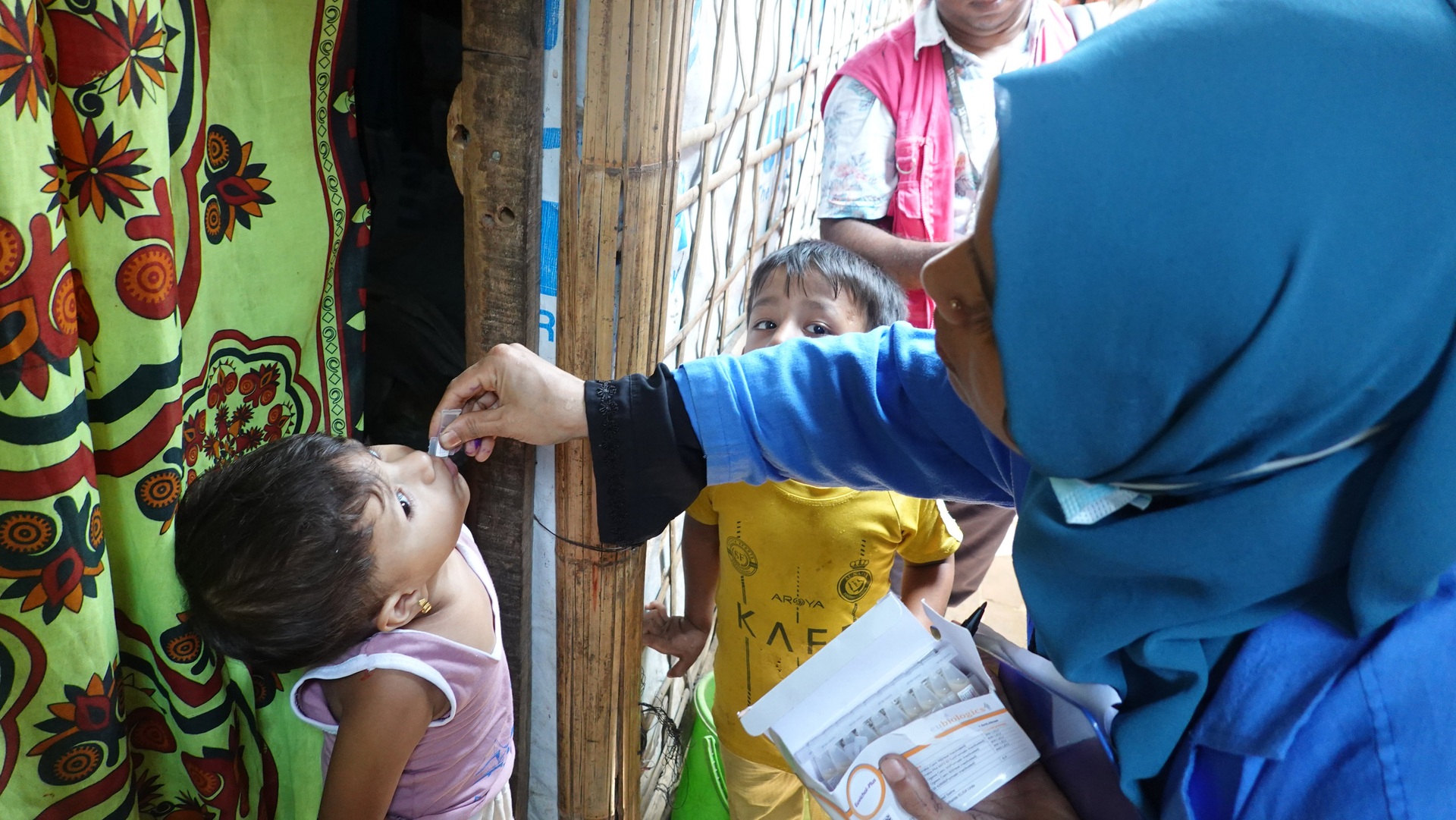 A young girl receives the 2nd dose of the OCV Vaccine in the Rohingya Camps. Photo by: WHO/Terence Ngwabe Che
A young girl receives the 2nd dose of the OCV Vaccine in the Rohingya Camps. Photo by: WHO/Terence Ngwabe Che
In April 2025, WHO, in collaboration with the Government of Bangladesh and health sector partners, launched the second round of a targeted Oral Cholera Vaccination (OCV) campaign in Cox's Bazar. This initiative aims to administer a second dose of the vaccine to Rohingya refugee children aged 1 to 5 years.
This builds on the success of the initial mass vaccination campaign conducted in January 2025, across the Cox's Bazar, Bandarban districts, and on Bhasan Char Island. A total of 1.4 million doses were administered from the 1.6 million doses supplied by the International Coordinating Group on Oral Cholera Vaccine Provision for Cholera Control.
The vaccine deployment followed an approved request by the Directorate General of Health Services, Communicable Disease Control, with operational support from Gavi, the Vaccine Alliance.
WHO and King Salman Humanitarian Aid & Relief Centre expand life-saving health interventions
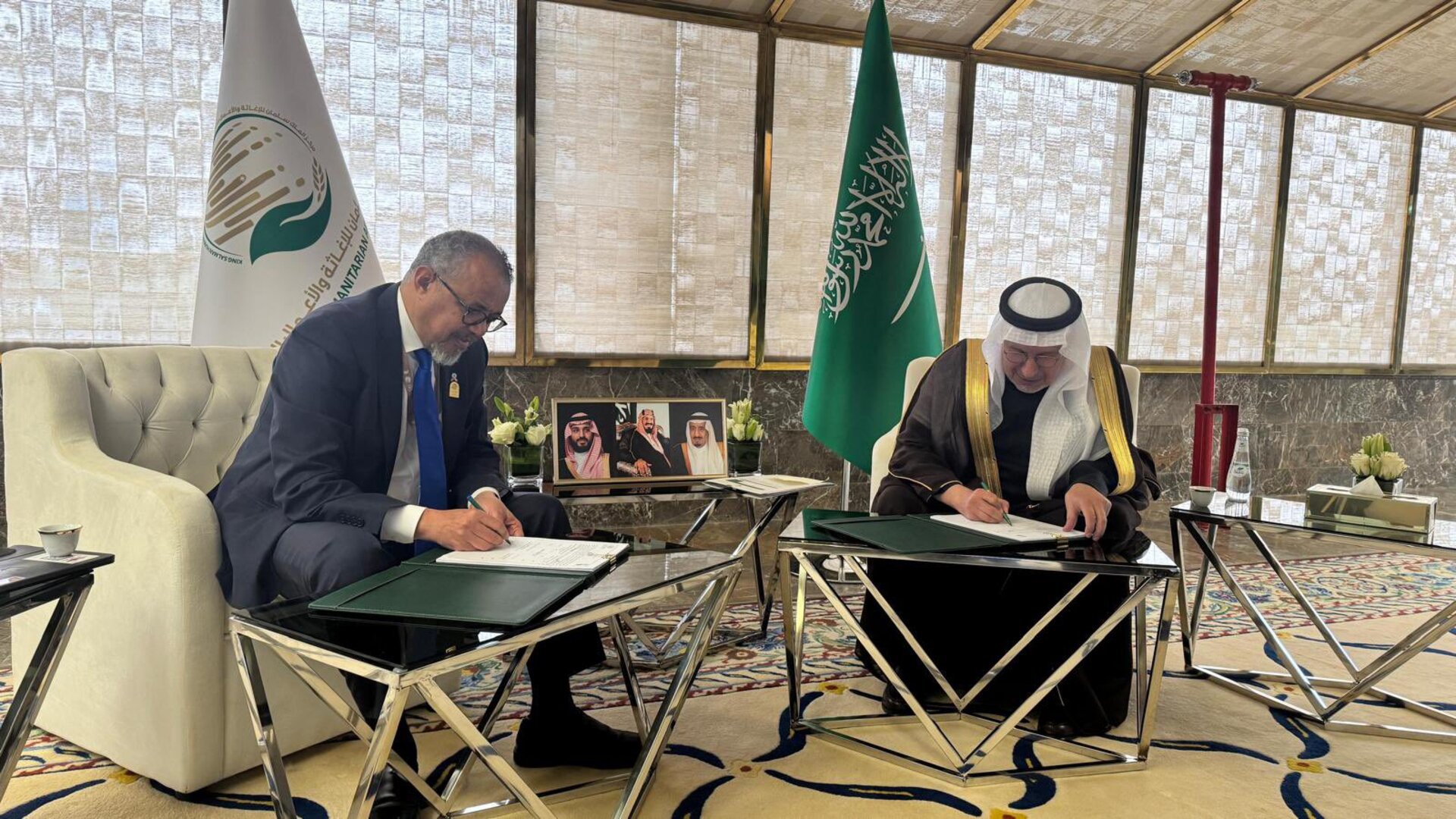 KSRelief Supervisor-General, Abdullah Al Rabeeah, and Dr Tedros, signing funding agreements in response to humanitarian crises at the Riyadh International Humanitarian Forum on 24-25 February 2025, Kingdom of Saudi Arabia. Photo by: WHO/Karim Yassmineh.
KSRelief Supervisor-General, Abdullah Al Rabeeah, and Dr Tedros, signing funding agreements in response to humanitarian crises at the Riyadh International Humanitarian Forum on 24-25 February 2025, Kingdom of Saudi Arabia. Photo by: WHO/Karim Yassmineh.
WHO and the King Salman Humanitarian Aid and Relief Centre (KSrelief) agreed on a series of new pledges to deliver life-saving health measures for people threatened by cholera and malaria in Yemen. The pledges also support health services for Sudanese who have fled conflict to neighbouring Egypt, and to support polio eradication efforts in countries where the virus continues to circulate. The agreements were signed during the fourth Riyadh International Humanitarian Forum, being held on 24-25 February.
WHO's Country Office in Yemen and KSrelief finalized a donation of US$ 2.1 million to support an existing agreement to expand cholera response and control measures, and improve access to treatment in affected and high-risk areas.
Purified water, lives saved: the fight against cholera in Haiti continues
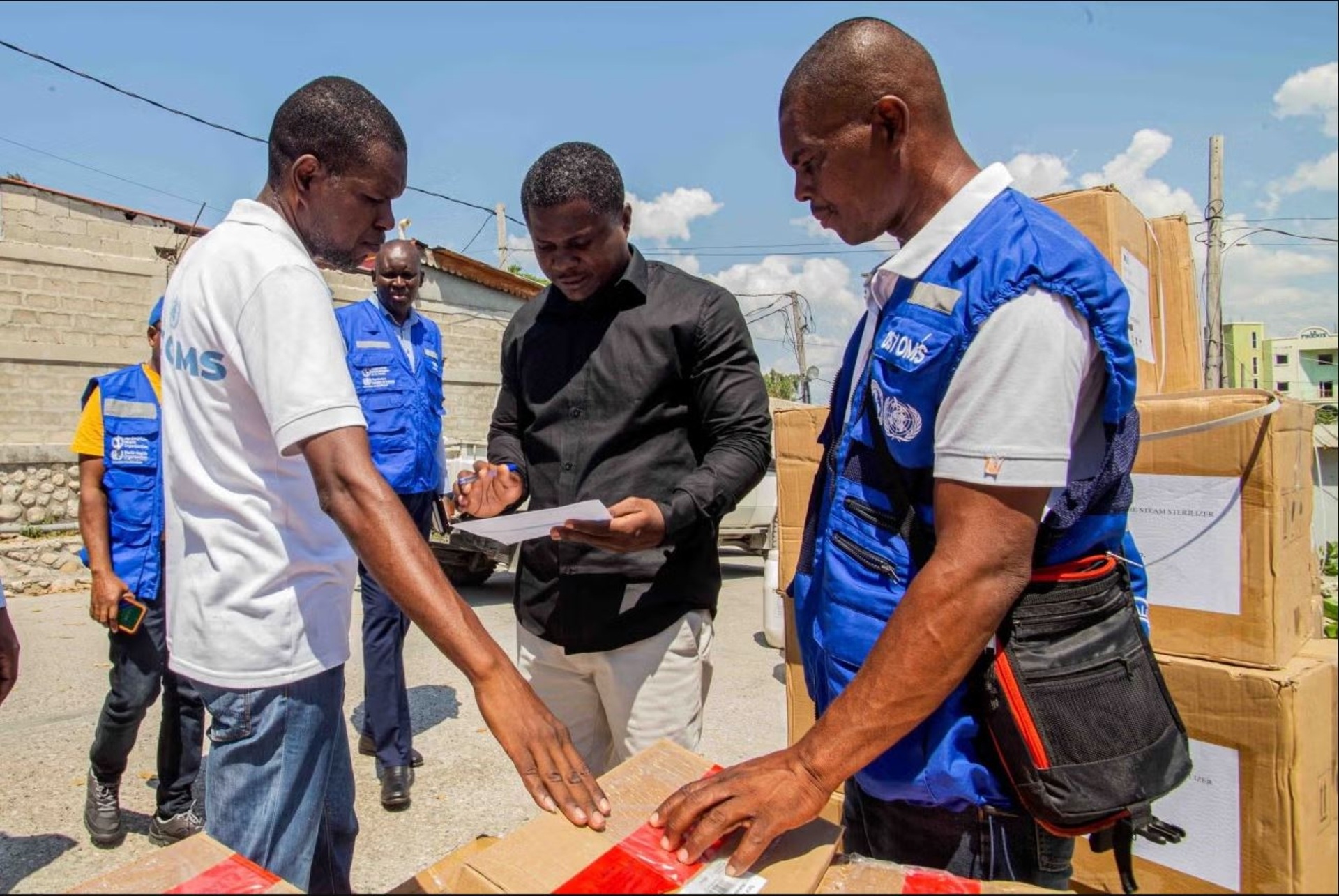 OPS/WHO delivering materials to the Ministry of Public Health and Population to respond against cholera. Photo by: OPS/WHO
OPS/WHO delivering materials to the Ministry of Public Health and Population to respond against cholera. Photo by: OPS/WHO
PAHO/WHO continued to support the Ministry of Public Health and Population in its fight against cholera since its resurgence in October 2022. Access to clean and safe water remains a major challenge in Haiti and is a key factor in the decline of the disease across the country.
With support from the UNCERF and in partnership with the health authorities, PAHO/WHO implemented a project to improve access to drinking water for Acute Diarrhea Treatment Centres, facilities established to treat cholera patients.
Installing a water treatment unit made it possible to supply drinking water, on demand, by tanker trucks to a network of 15 distribution points, consisting of tankers installed in as many health facilities throughout the department. In the second phase, 218 departmental health officers were trained on methods for accessing drinking water, effective sanitation techniques, and essential hygiene practices to prevent water-related diseases.
Read the full story (in French)
Malawi declares end of cholera outbreak
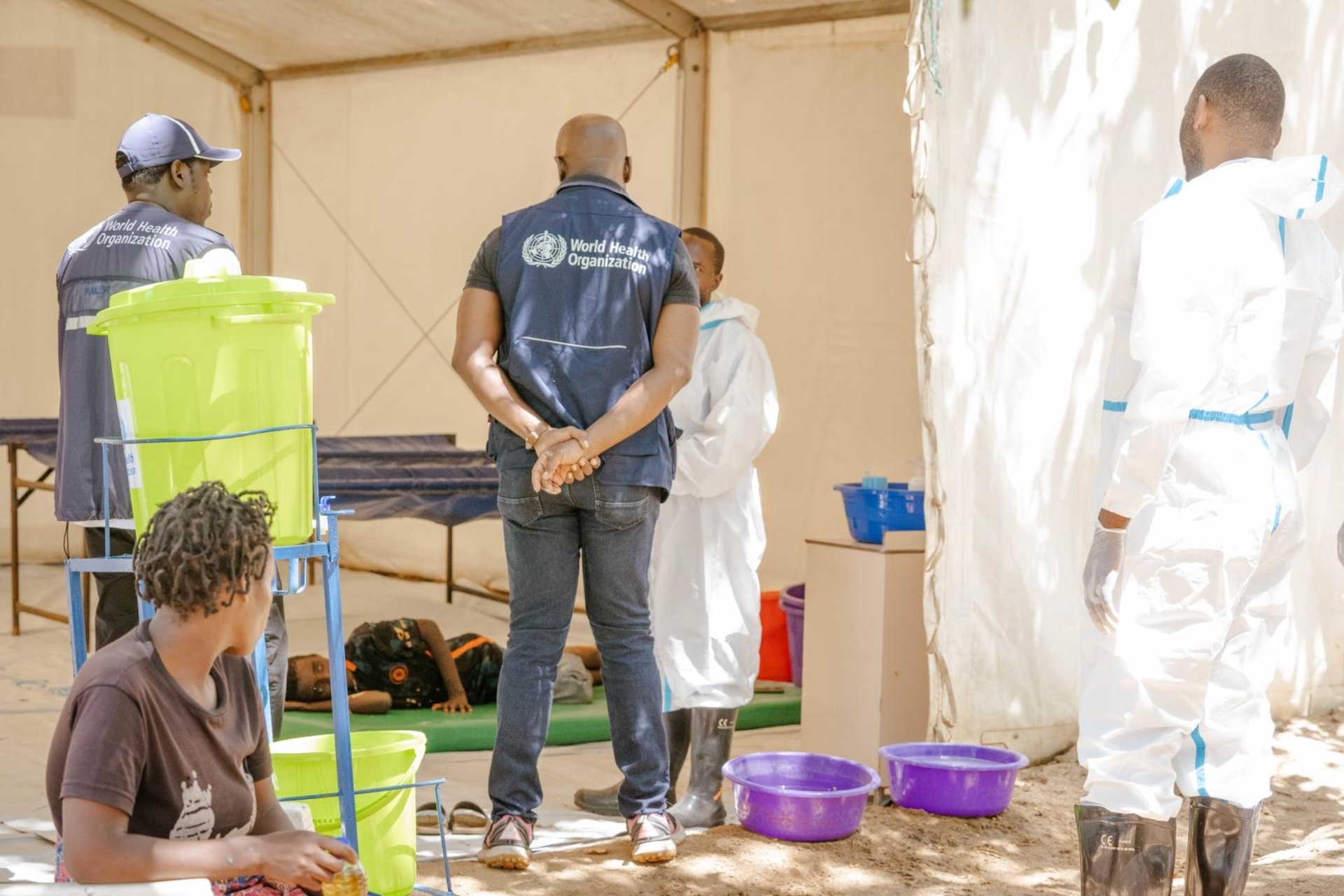 Case management at Area 25 cholera treatment centre. Photo by: WHO/Ovixlexla Kamenyagwaza-Bunya
Case management at Area 25 cholera treatment centre. Photo by: WHO/Ovixlexla Kamenyagwaza-Bunya
The Government of Malawi, through its Public Health Institute, declared the end of a protracted cholera outbreak that started in March 2022 and lasted over two years. WHO and partners supported the set-up of cholera treatment centres and units and oral rehydration points, provided clinical mentorship, and supported the development of referral guidelines and standardized patient records from the initial stages of the outbreak.
The surveillance team supported the roll out of the One Health Surveillance Data Platform, intensified case investigations, and strengthened laboratory testing and event-based surveillance. WHO also provided support for oral cholera vaccination campaigns, where over four million doses were administered with a utilization rate of almost 100%.
To strengthen resilience and bolster global health security, in June 2023, WHO conducted a Scoping Mission which led to the development of a 2-year roadmap. WHO continues to work with multi-sectoral partners and the donor community to support implementation of these priorities. In 2024, USAID and FCDO UK provided funds towards preparedness activities.
South Sudan steps up vaccination, response measures to curb cholera
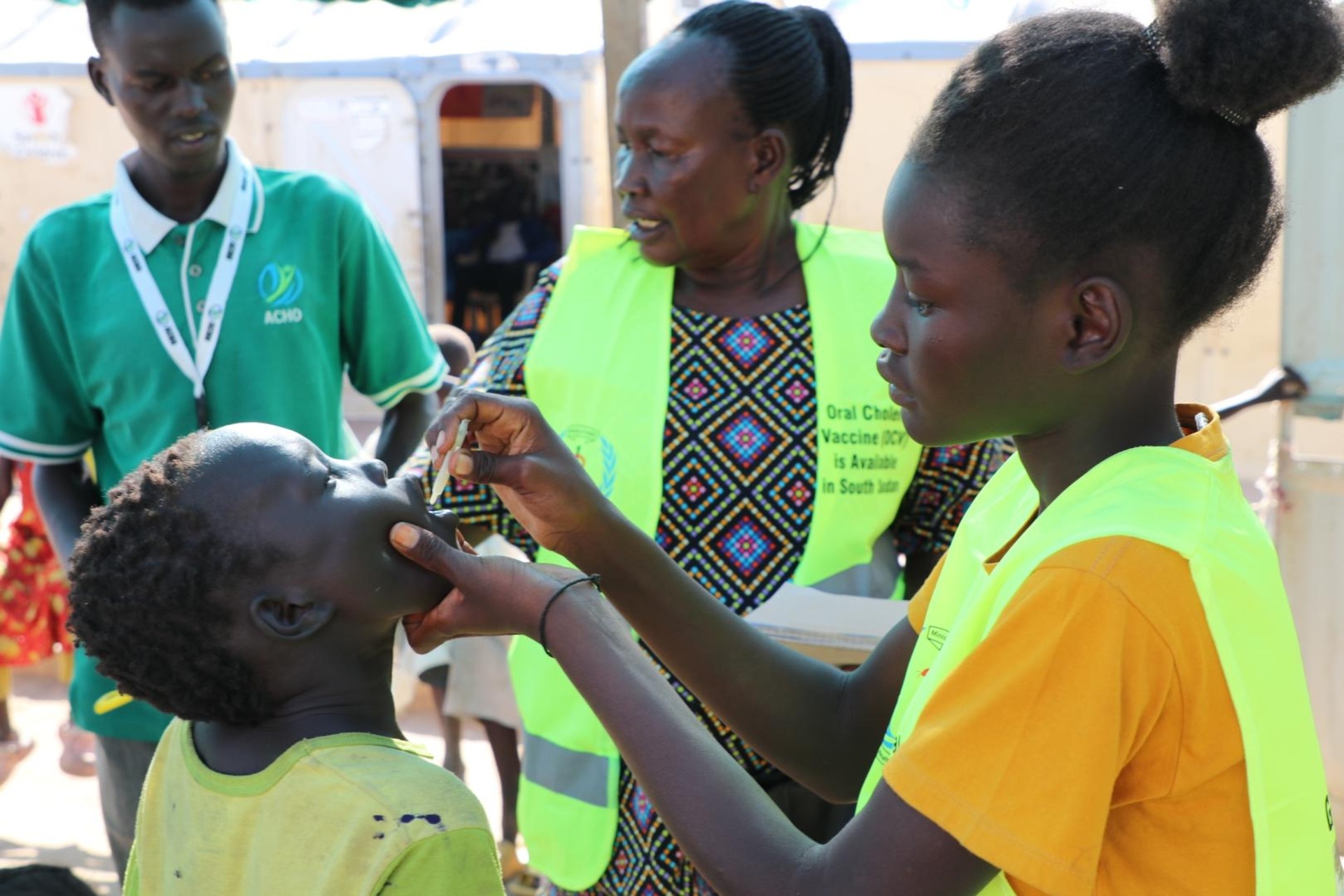 A vaccinator administering oral cholera vaccine in Renk, Upper Nile State, during December 2024’s campaign after the September outbreak declaration.
A vaccinator administering oral cholera vaccine in Renk, Upper Nile State, during December 2024’s campaign after the September outbreak declaration.
Photo by: WHO/Atem John Ajang
The Government of South Sudan declared a cholera outbreak in October 2024. In January 2025, the Ministry of Health, with support from WHO and partners, rolled out several oral cholera vaccination campaigns in four high-risk countries: Malakal, Juba, Renk, and Rubkona.
With support from Gavi, the Vaccine Alliance, around four million doses of the vaccine were approved and around 910 000 doses administered (as of January 2025) in the four counties, which is above 90% coverage.
WHO continues to distribute essential medical supplies for cholera response to local and national health authorities and partners, which can treat 4 700 cholera cases. WHO has also facilitated the establishment of a 50-bed cholera treatment centre at Juba Teaching Hospital and is supporting the deployment of nine rapid response teams from national level to 11 priority counties to support implementing partners on the ground to provide critical case management.
Scaling up cholera testing in Zimbabwe
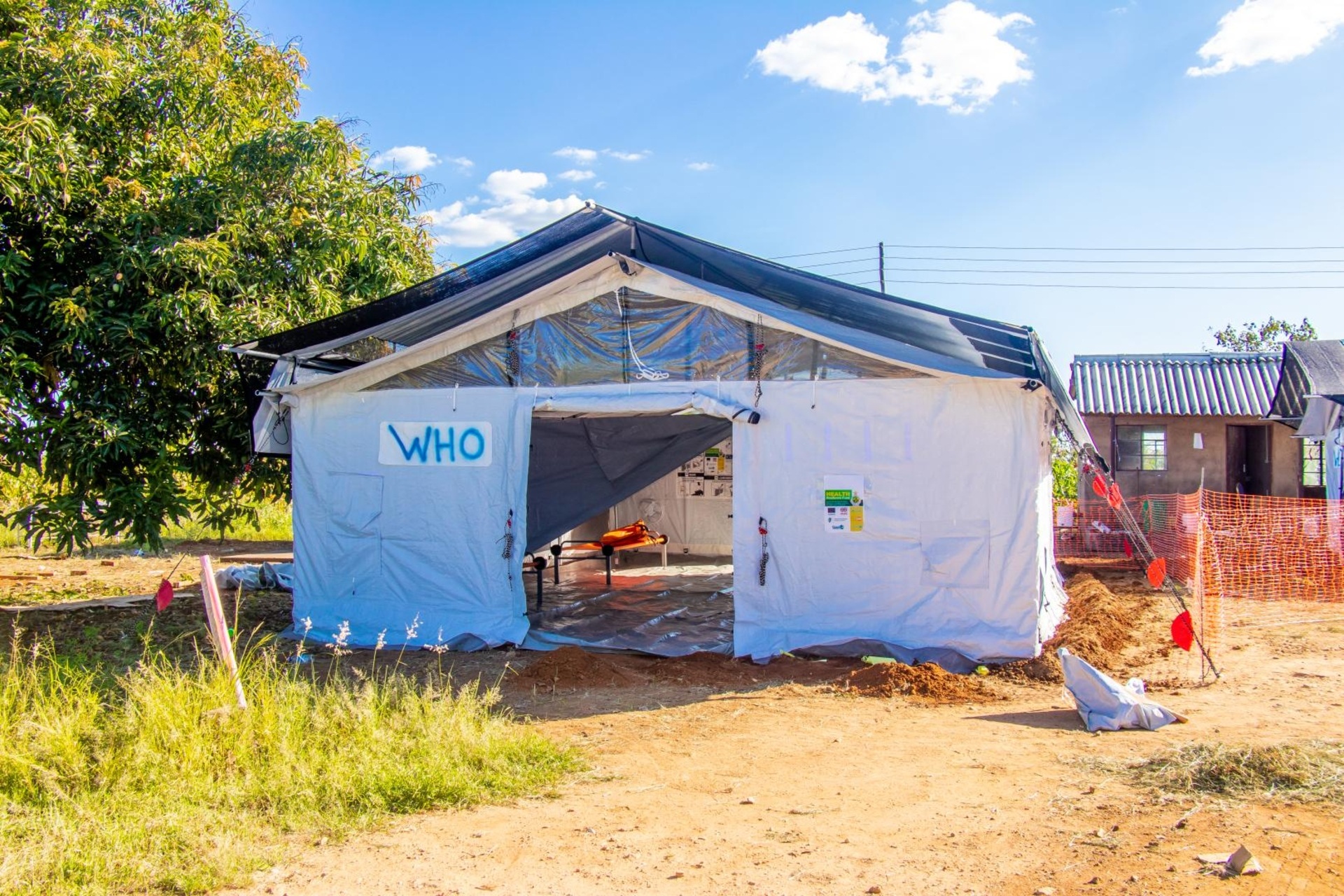 WHO staff build cholera treatment centres with support of communities. Photo by: WHO/Vivian Mugarisi
WHO staff build cholera treatment centres with support of communities. Photo by: WHO/Vivian Mugarisi
To ramp up testing for cholera in Zimbabwe, WHO supported the Ministry of Health and Child Care (MoHCC) with training of 986 nurses in antigen Rapid Diagnostic Test (RDT) testing, addressing critical staff shortages at rural health centres. Additionally, 44 laboratory personnel at provincial and district levels were trained in cholera culture, further strengthening diagnostic capacity.
Prior to the training programme, testing capabilities were limited. Between the outbreak's onset in February 2023 and 18 January 2024, only 2 090 antigen RDTs and 2 250 culture tests were conducted across 10 health centres. Following the training, the number of antigen RFT tests increased to 9 853, a staggering 371% increase. The success of the programme is attributed to the collaborative efforts of various stakeholders including UNICEF, Higher Life Foundation, JHPIEGO, World Vision International and WHO, with MoHCC leading the efforts.
Funding for the training activities came from the Health Resilience Fund (HRF), UNCERF and the United States Department of the State (USDOS). HRF is a pool of funding from the European Union, the Government of Ireland and the United Kingdom, as well as Gavi, the Vaccine Alliance.
Additionally, in a significant boost to Zimbabwe's healthcare infrastructure, WHO donated a wide range of medical equipment to the Ministry of Health and Child Care (MoHCC). The equipment, valued close to USD$1.8 million, was funded by various donors and partners, including the African Development Bank (AfDB), the UN Central Emergency Response Fund (UNCERF), USAID, and the Government of Japan.
Read the full stories here and here
***
Read more about WHO's work on cholera
The donors and partners acknowledged in this story are (in alphabetical order)
African Development Bank, European Union, French Development Agency, Germany, Gavi, the Vaccine Alliance, Health Resilience Fund, Higher Life Foundation, International Coordinating Group on Oral Cholera Vaccine Provision for Cholera Control, Ireland, Japan, JHPIEGO, King Salman Humanitarian Aid and Relief Centre, United Kingdom Foreign Commonwealth and Development Office, UNICEF, UN Central Emergency Response Fund, UN Multi-Partner Trust Fund Office (MPTF), United States Department of the State, USAID, World Vision International.
WHO's work is made possible through all contributions of our Member States and partners. WHO thanks all donor countries, governments, organizations and individuals who are contributing to the Organization's work, with special appreciation for those who provide fully flexible contributions to maintain a strong, independent WHO.
